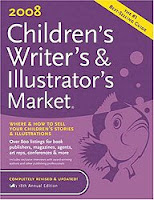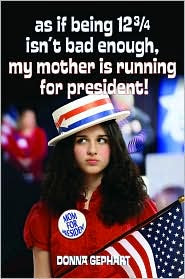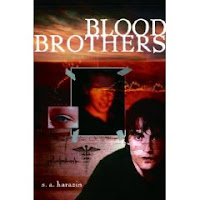Publication date: 9 October 2012 by Delacorte Books for Young Readers
ISBN 10/13: 0385738366 | 9780385738361
Category: YA Realistic Fiction
Keywords: Siblings, selfishness, faith, lies
Format: Hardcover, eBook,
Audible download
Source: Netgalley
From Goodreads:
Caro Mitchell considers herself an only child—and she likes it that way. After all, her much older sister, Hannah, left home eight years ago, and Caro barely remembers her. So when Caro’s parents drop the bombshell news that Hannah is returning to live with them, Caro feels as if an interloper is crashing her family. To her, Hannah’s a total stranger, someone who haunts their home with her meek and withdrawn presence, and who refuses to talk about her life and why she went away. Caro can’t understand why her parents cut her sister so much slack, and why they’re not pushing for answers.
Unable to understand Hannah, Caro resorts to telling lies about her mysterious reappearance. But when those lies alienate Caro’s new boyfriend and put her on the outs with her friends and her parents, she seeks solace from an unexpected source. And when she unearths a clue about Hannah’s past—one that could save Hannah from the dark secret that possesses her—Caro begins to see her sister in a whole new light.
Alethea's review:I've been an Anna Jarzab fan ever since reading her debut,
All Unquiet Things. I found it to be literary, emotionally wrenching, complex and moving. I was especially intrigued to learn she was tackling another unusual topic: the homecoming of an estranged sister, not just any sister, but a
Sister. I thought it strange subject matter from the get-go. What does an average YA realistic fiction reader care about a young woman taking holy orders?
Carolina Mitchell is a spoiled brat. Especially in the first half of the book, the author lets her have free rein--with all the tantrums and attitudes she exhibits, you would think she was about 7 or 8 years old and not a teenager. To Caro, her situation is incomprehensible: her sister Hannah, a virtual stranger now, has left the cloister she has lived in for eight years. She doesn't even remember how deeply she used to worship the golden girl Hannah was before, and in the face of this gloomy, withered sibling, Caro clings selfishly to all that she can hold.
I worried a little bit that the religious themes would be uncomfortable--they're not what I seek to read normally--but the author handles them with sensitivity and grace. One of my favorite characters was Father Bob, who relates to Caro in unexpected ways; he listens instead of berates and is a refreshingly positive portrayal of an authority figure in a YA novel.
I thought the elder Mitchells were very real, though some of Caro's friends are too flat to care about in any palpable way. I liked Pawel and the relationship that springs up between him and Caro, and I liked even more the fact that the romance takes a backseat to the Mitchell family's dynamics. I found the interactions between Caro, Hannah, and their mom and dad to be very touching.
The "mystery" of Hannah's vocation--the dark secret that she has to marry God to escape--is quite predictable, but the author's treatment of it from several angles renders its complexity as it boils down to the unavoidable core of Hannah's malaise. Jarzab skillfully peels away the onion skin layers of conflict, self-blame, and tragedy; I think it would take quite a cold reader to be able to look away, especially once Caro begins to grow into her role and take charge of the situation.
A lot of readers might find Caro's self-centeredness too off-putting to finish the book, but those readers would be missing the best part--a real transformation from holy terror, not into an angel, but into something more human.
I can't wait to see what Anna Jarzab will tackle next.
*I received this book free of charge from the publisher in exchange for an honest review. This, in no way, affected my opinion or review of this book.
Find out more about the author at
www.annajarzab.com, on
Facebook, and follow @
ajarzab on Twitter.
At the Arkansas SCBWI conference this weekend, I met Krista Vitola of Delacorte and Ariel Richardson of Chronicle. Here’s the skinny.
Note: Please look for their submission guidelines and follow them carefully.
Meet Krista Vitola, Assistant Editor, Delacorte Press
Official bio: Krista Vitola is assistant editor at Delacorte Press. Upon graduating with a Bachelor of Arts from Villanova University in 2008, Krista began working at Delacorte Press, a division of Random House Children’s Books. A lover of middle-grade and young adult fiction, she’s always in search of a story with a strong protagonist and unique voice. Her list ranges from Victoria Laurie’s middle-grade adventure series, Oracles of Delphi Keep, to Sophie Littlefield’s young adult thrillers.
In previous posts about meeting editors, I’ve described them in terms of super hero(ines), popular characters or folk/fairy tale characters. Read about:
Following those precedents, Krista is as beautiful as the lovely Snow White, but this Snow White is a 21st Century dynamo, no cowering female here. She’s stuffed her magic mirror into the recesses of her closet, probably only saving it for her wedding day. Instead, as a speaker, she put us dwarves through training exercises. She’s a marathoner–at least 10 full marathons and so many half-marathons she’s lost track–and she uses her intimate knowledge of children’s literature to coach writers with encouragement and a standard of excellence.
For example, one of her pet peeves is what she calls “list actions”. When you try to Show-Don’t-Tell, one misstep is when you rely too heavily on a “subject-strong verb” construction.
“A shaft of sunlight slanted across the tundra and struck the troll. The roar stopped. The tundra paused, silent.”
This is a step above a telling that simple says, “The sun rose and it was quiet.” But the sentence patterns are too static, creating what Krista terms “list actions.” To revise, break it up with dialogue or thoughts, or revise for better sentence variety.
Krista edits MG and YA, preferring stories about guys (must also include a strong female, though, for marketing) and she buys voice.

Ariel Richardson, Editorial Asst, Chronicle Books (on left), and Krista Vitola, Asst. Editor, Delacorte Press
Meet Ariel Richardson, Editorial Assistant, Chronicle Books
Official bio: Ariel Richardson is a children’s editorial assistant at Chronicle Books (read their blog) in San

The world of children’s literature is full of generous and supportive people. First and foremost among these are the authors. If they’re competing for shelf space and bestseller lists, they certainly don’t act like it. I’m new to this world, but have been lucky enough to meet and learn from dozens of authors. Kurtis Scaletta has been at this about as long as I have, but it would seem as though he’s been doing it forever. He’s already a seasoned pro. His newest book is The Tanglewood Terror, a beautiful mash-up of classic science fiction, football, bicycle-back adventure, and bittersweet family drama, with a healthy dose of adolescent awkwardness mixed in. It will be released on the same date as The Only Ones: tomorrow! To celebrate the occasion, we decided to interview each other. I’m answering questions on his blog. He’s answering questions here. If you can find a better deal than that, then pin a tail on me and call me a donkey. Because it don’t exist.
Aaron: First off, congratulations on crafting an utterly unique story, a gentle but ominous tale about a plague of mushrooms and a family struggling to hold itself together. And congratulations on your third book in three years (after Mudville and Mamba Point). It’s an astounding accomplishment, especially considering they’re each stand-alone novels set in vastly different times and places.
Kurtis: Thanks. I published my first book at age 40 and I think I was trying to make up for lost time by putting out a book a year.
Aaron: I guess that leads to my first question. In a children’s book industry dominated by trilogies and series, what is it about the stand-alone novel that appeals to you?
Kurtis: Kids love series, no doubt about it. They ask about sequels a lot. I think it’s because they feel really connected to the characters, they make these temporary friends and want to keep seeing them. But I’m usually focused on a kid in a time of upheaval and transformation. By the end of the book, that kid and the world around him have changed too much to go back and do it again. But I did love series as a kid, too, and I have one in the works… it’s for younger readers than my first three novels so it can be a little more static.
Aaron: The Tanglewood Terror is set in present day Maine, in a world of cell phones and the internet. Yet it also seems to exist in a time when kids were granted more freedom. The characters roam the woods for hours on end. There are none of the “helicopter parents” we hear about. The wonderful title and cover art communicate the retro aspect of the story, but I’m curious how this notion of freedom and autonomy informed your writing. Was it something other than nostalgia for you? It reminds me of the
Texas Gothic by Rosemary Clement-Moore
ISBN 10/13: 0385736932 | 9780385736930
Category: Young Adult Contemporary Fantasy
Format: Hardcover (Also available in eBook/Kindle format)
Keywords: Ghosts, romance, family
Alethea's Review:
The author and I both attended RT's first Teen Day Convention last April. I listened to Rosemary Clement-Moore read one of the first chapters of Texas Gothic, where Amaryllis "Amy" Goodnight meets her next-door neighbor clad only in her undies (and rain boots) while trying to chase away his cattle, who happen to be humping her Mini-Cooper. If there had been room to roll on the floor, that's where I would have been.
The book just came out a few weeks ago... there were lots of other great books to keep me occupied since April, but Texas Gothic stayed pretty much in the forefront of my mind! When I finally did crack it open, I didn't put it down until I turned the very last page (at about 4 am). That's a true RNSL 5-star rating!
There's nothing like humor, sass, and a Texas twang to really get me hooked on a book. Did I mention the neighbor is a hot cowboy? Ok, he's a little cranky especially where Amy's concerned, but she's no wilting violet (though she has a cousin Violet... still, none of the Goodnight women sound like the wilting kind).
Amy and her gorgeous older sister Phin (short for Delphinium--do you sense a theme?) are smart, fairly responsible young people who are spending the summer taking care of their aunt's farm, which happens to be smack in the middle of Cute Cranky Cowboy's ranch. (Er, not the character's real name. Everyone who's not Amy calls him Ben McCulloch.)
So while they do get into some scrapes of both the realistic and otherworldly varieties, they've both got the brains and guts to get themselves out of trouble. I really enjoyed them. There are some great side characters, too, like the ghost of their late Uncle Burt, Ben's grampa Mac McCulloch, and the students volunteering at a dig site on the ranch. Think Scooby-Gang lite.
Aside from writing a great cast of characters, Clement-Moore does a great job of interspersing magic, science, and history to tell a hell of an entertaining tale. For a ghost story, it wasn't that scary (but then, the last time I really got creeped out by a book was The Shadow of the Wind and that was a few years ago) but the family dynamic, romance, and mystery were spot on. Pour yourself an ice-cold Dr. Pepper and prop your feet up on the porch to enjoy this fun summer read to the fullest.
.jpeg?picon=3655)
By: Read Now Sleep Later,
on 4/26/2011
Blog:
Read Now Sleep Later
(
Login to Add to MyJacketFlap)
JacketFlap tags:
sex,
Delacorte,
bad seeds,
TyRoth,
SoShelly,
RandomHouse,
history,
Realistic,
giveaways,
Add a tag
I forgot to add this to the review post, so here's a separate one.
I'm giving away my ARC of So Shelly by Ty Roth.
Until now, high school junior John Keats has only tiptoed near the edges of the vortex that is schoolmate and literary prodigy, Gordon Byron. That is, until their mutual friend, Shelly, drowns in a sailing accident.
After stealing Shelly's ashes from her wake at Trinity Catholic High School, the boys set a course for the small Lake Erie island where Shelly's body had washed ashore and to where she wished to be returned. It would be one last "so Shelly" romantic quest. At least that's what they think.
As they navigate around the obstacles and resist temptations during their odyssey, Keats and Gordon glue together the shattered pieces of Shelly's and their own pasts while attempting to make sense of her tragic and premature end.
I very much believe that every book has its reader, and while I
liked this novel, it didn't wow me. I want someone to have this who will
love it. It's got historical elements, poetry and drama. This is a YA novel with some very adult topics--sex and violence--so please, if you're young and impressionable, don't enter the giveaway :/ I don't want to be in trouble with your parents!
Read the review and if you think you would like to win this book, comment below (not on the review post) and tell me why you'd like to read this book. Make sure your
email is in there somewhere--so I can contact you if you win.
I'll choose a winner at Midnight on May 1, using the
random number generator. I'll mail to the US or Canada.
Tweet the link to this page for an extra entry (leave the link in the comments!)
Good luck!

So Shelly by Ty Roth
Publication date: 8 February, 2011 from Delacorte Books for Young Readers
ISBN 10/13: 0385739583 / 9780385739580
Category: Young Adult Realistic
Format: Hardcover
Keywords: Contemporary, historical fiction, sex, death

From
goodreads.com:
Until now, high school junior John Keats has only tiptoed near the edges of the vortex that is schoolmate and literary prodigy, Gordon Byron. That is, until their mutual friend, Shelly, drowns in a sailing accident.
After stealing Shelly's ashes from her wake at Trinity Catholic High School, the boys set a course for the small Lake Erie island where Shelly's body had washed ashore and to where she wished to be returned. It would be one last "so Shelly" romantic quest. At least that's what they think.
As they navigate around the obstacles and resist temptations during their odyssey, Keats and Gordon glue together the shattered pieces of Shelly's and their own pasts while attempting to make sense of her tragic and premature end.
How I found out about this book: Alethea picked up the ARC at ALA Midwinter in San Diego, having lusted after the cover.
Alethea's review: I don't know what I was expecting from a novel that's essentially a present-day retelling of the lives of three (or rather, four--Shelly is a composite of two Shelleys--Mary Wollstonecraft and Percy Bysshe) of the most talented but messed-up people to ever grace the pages of literature. There are a ton of things in the novel that most mainstream YA readers won't like. It's chock-full of sex (specifically incest, rape, and molestation), obsession, and grief. There is, at one point, a murder in which one of the three main characters figures prominently, yet doesn't seem to undergo any emotional change, other than to remove himself from the situation. The thing is, they're in the book because they reportedly happened to their real-life counterparts, not just to titillate.
I'm not saying the novel is without merit. The characters are engaging, though they skew more towards cautionary-tale rather than model-citizen. Keats is a sympathetic narrator and the most relatable of the three. Shelly and Gordon have the tendency to go off the deep end--in massive ways, especially since they are spectacularly privileged (Shelly having been born rich; Gordon having the pedigree but restoring family fortune by writing an
Eragon-type novel at a very young age). Never before has the lack of parental supervision been so blatantly exploited as in the love-polygon of Shelly chasing Gordon, and Gordon chasing every other woman who isn't her, including various of his relatives, caretakers, and best-friend's-stepsisters.
While the novel does a great job of capturing the spirit of Romanticism and retelling, piece by sordid piece, the lives of three great writers,
So Shelly would best be enjoyed by those who can appreciate--or maybe tolerate--erotica and shameless depravity. Ultimately the themes of friendship, loyalty, and forgiveness
 |
| l to r: Aaron Hartler, Nancy Conescu, Rachel Griffiths, Michelle Poploff |
SCBWI's own Aaron Hartzler moderates a panel of editors offering post-critiqe advice. Here are some highlights.
Nancy Consescu (Dial): Revision is a process. Post critique, you have to consider the various comments, decide how to address things, and try different things until you get to what works. She asks her authors to start with making big changes that will resonate through the manuscript. She suggests really looking at your chapter endings and be sure you're giving readers a reason to turn the page. Also really look at the dialogue specific to each character to be sure what they say rings true to each character. She stresses, as you work with an editor, that there's a period of digesting the suggestion that must take place.
Rachel Griffiths (Scholastic): She hopes that a manuscript has been revised maybe ten times by the time it gets to her. She suggest that writers pay attention to what you're feeling as you read it--does your mind wander, is something is confusing? If you're ever stuck on a revision, you just work on it, go over things over and over again, and it eventually it can turn into something magical. She reads through and looks for one flash of greatness in a mediocre manuscript, and suggests her authors revise the rest of the pages to get to that level. She hopes that's authors take about 50% of her revision suggestions and that they don't work with the suggestions that don't feel true to them. She stresses the importance of working on your craft because that's what makes you get better and better and grow as a writer.
Michelle Poploff (Delacorte): (Note: She was the editor for this year's Newbery winner MOON OVER MANIFEST by Clare Vanderpool, the first debut author to win the award in 30 years. Also note: She's found four authors at SCBWI conference over the past few years.) The revision process between writer and editor varies depending on authors preferences and working style. She always tells authors to read out loud and she's a big fan of writers groups, saying that if you belong to a writing group, they can be very helpful advocates. She also suggests writers let things percoloate for a while as you revise. Revision is like redecorating, and sometimes you rearrange all the furniture in the room, and still there's still a lamp that's in the wrong place. She wants authors she works with to take their time to do the very very best they can on revising.
Debut Author of the Month:
Libby Schmais
 Je suis heureux de vous informer that starting today, I'm reviving le Debut Author du mois feature on mon blog. (Those of you who contacted me for First Books: You may be hearing from in months to come.)
Je suis heureux de vous informer that starting today, I'm reviving le Debut Author du mois feature on mon blog. (Those of you who contacted me for First Books: You may be hearing from in months to come.)
January's DAotM is Libby Schmais, whose YA debut is The Pillow Book of Lotus Lowenstein, released from Delacorte en Décembre. Says Kirkus: "readers of any age will savor Lotus’s panache...Chick lit par excellence." You can read a délicieuse excerpt here.
Describe your debut YA novel, The Pillow Book of Lotus Lowenstein.
The Pillow Book of Lotus Lowenstein is a diary book by a teenager living in Brooklyn who is obsessed with all things French. Lotus feels stifled by her life in Park Slope, Brooklyn and fancies herself an existentialist, although her real knowledge of that philosophy and actual French words is a little sketchy. She and her best friend Joni end up both liking the same guy, another Sartre aficionado, and things come to a head during a school trip to Montreal, challenging both her friendship and her freethinking ideas.
You’d published a couple of books for adults—what made you write for a YA audience?
I didn’t consciously set out to write a YA book. The character of Lotus appeared to me one day, and the voice was a teenage one, so I just kind of went with it. I think if I had decided to write a modern-day YA novel from the beginning, I would have been intimidated, because it was out of my comfort zone.
Why did you choose diary format? Have you kept journals at some point?
Well, Lotus is studying The Pillow Book of Sei Shonagan in school, a famous Japanese diary book so that’s part of the reason I chose the diary format. The other reason is that I’ve always wanted to write a diary book. So many of my favorite books are diary books, like I Capture the Castle,
Hi Wendy, thanks for joining us today. 
First, why don't you tell us a little about yourself.
After the requisite liberal arts degree, I began my career in the managing editorial group at Grosset & Dunlap/Putnam, and for the past fifteen years have been with Delacorte Press, where I’m an executive editor working primarily on middle grade/tween/teen fiction. Delacorte Press is an imprint of the Random House Children’s Book group; there are five editors including myself, three assistants, and our vp/publisher, Beverly Horowitz.
I’ve also written a number of books for young readers—series fiction, movie tie-ins--which I like to think makes me a more empathetic editor. Revisions? Criticism? I've been there.
We have a web site we’re quite proud! Please check us out at Randomhouse Kids and Random Teens.
We also have an active presence on Facebook. You can check out a few of RHCB books on Facebook:
You can also keep up to date on all the latest news from Random House Children’s Books by following us on
Twitter, where we tweet about author events, awards announcements, and new book reviews:
In your opinion, how important is social networking? Very important. We find that our authors who have a real online presence are making important connections with educators, parents, librarians, and readers, which translates into good book buzz and sales. Kids live online and writers who write for kids want to live in that world as well. Some websites/blogs are reaching out to adults and others are more kid-driven—both serve a purpose. It also helps in the acquisition process to gain insight into a potential author—read their blog, see what type of content they’
ve created, what kind of community is responding to their work.
The writing must always come first, though.





















this one sounds really unique. i can't think of a ya book that has anything to do with holy orders. maybe grave mercy but that's different. hadn't heard of this one but you've definitely piqued my interest.
I actually prefer this to her first book (which I already thought was good and rated 4/5 stars; the only thing I didn't like was the cover. But I didn't dislike it enough to even take a star off, haha :)